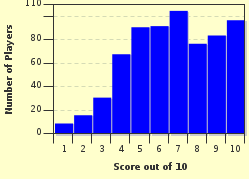Quiz Answer Key and Fun Facts
1. "Eve of Destruction" was a Number One hit in 1965 for Barry McGuire. In 1962 Barry became part of a folk group where he co-wrote and sang one of their hits, "Green, Green". Which group was Barry with before he had his breakthrough solo hit?
2. Dylan first recorded "The Lonesome Death of Hattie Carroll" on his "The Times They Are A-Changin'" album in 1964. The song relates an account of the killing of a black woman named Hattie Carroll the previous year and protests the light sentence given to her killer. Who was Hattie Carroll?
3. "The Universal Soldier" was a war protest song recorded by Donovan in 1964. The author of the song was a Canadian female artist who included the song on her "It's My Way!" album in 1964. She is also known for writing "Until It's Time for You to Go". Which artist wrote "Universal Soldier"?
4. Phil Ochs became known as a prominent protest singer. He preferred to call himself a "topical singer". Which of these songs was NOT written by Phil Ochs?
5. Which 1969 Number Six US Billboard hit by Kenny Rogers and The First Edition contained lyrics in which the singer revealed that he was a crippled veteran?
6. Country Joe and the Fish became known for their "I-Feel-Like-I'm-Fixin'-to-Die Rag" after Country Joe performed a version of the song at Woodstock in 1969. What is Country Joe's last name?
7. Which war protest song was adapted from a Ukrainian Folk song and credited to Pete Seeger and Joe Hickerson? It was recorded by the Kingston Trio in 1961, Peter Paul and Mary in 1962 and Joan Baez in 1965, among others.
8. Which 1964 posthumous release by Sam Cooke became an anthem for the Civil Rights Movement?
9. Which protest song was featured on the "Billy Jack" soundtrack in 1971 and was a Top Twenty hit for the band Coven and a Top Forty single by The Original Caste in 1969?
10. Which 1967 Arlo Guthrie anti-draft song was over 15 minutes long?
Source: Author
shanteyman
This quiz was reviewed by FunTrivia editor
ralzzz before going online.
Any errors found in FunTrivia content are routinely corrected through our feedback system.


